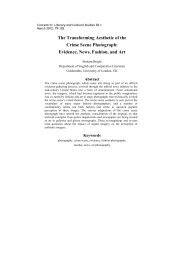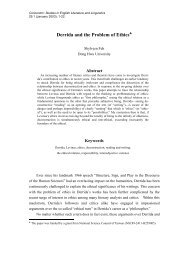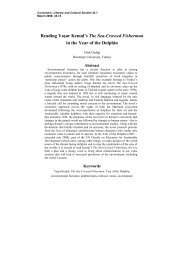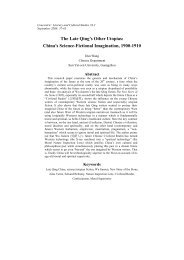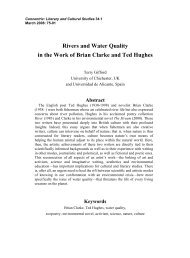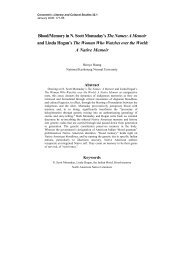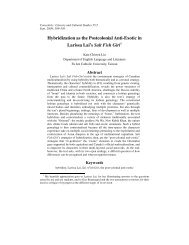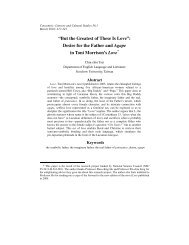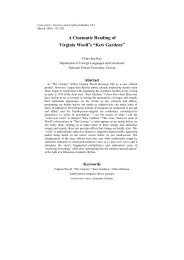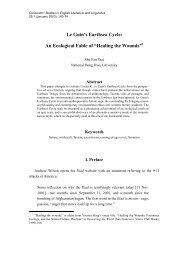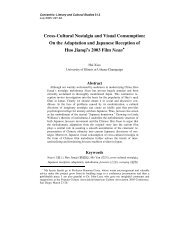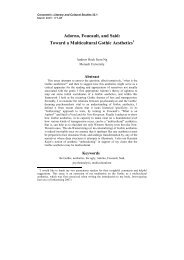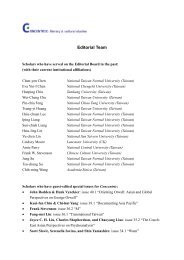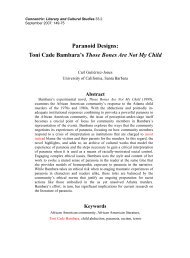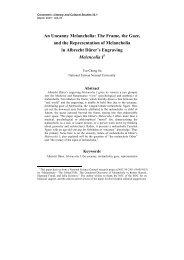The Gaze of the Other in Ang Lee's Crouching Tiger ... - Concentric
The Gaze of the Other in Ang Lee's Crouching Tiger ... - Concentric
The Gaze of the Other in Ang Lee's Crouching Tiger ... - Concentric
Create successful ePaper yourself
Turn your PDF publications into a flip-book with our unique Google optimized e-Paper software.
we owe people” but that “[i]t is a vital human need” (Taylor 26).<br />
I. <strong>The</strong> Emerg<strong>in</strong>g O<strong>the</strong>r<br />
185<br />
Tsai: Crouch<strong>in</strong>g <strong>Tiger</strong> and <strong>The</strong> Birds<br />
A symptomatic read<strong>in</strong>g <strong>of</strong> <strong>the</strong> (Eurocentric) narcissistic “I” <strong>the</strong>n suggests that for<br />
it <strong>the</strong> o<strong>the</strong>r is always an “alter ego” or “object” and as such someth<strong>in</strong>g that can be<br />
assimilated aga<strong>in</strong> with<strong>in</strong> <strong>the</strong> purview or “gaze” <strong>of</strong> <strong>the</strong> “I”—<strong>the</strong> “o<strong>the</strong>r” as someth<strong>in</strong>g<br />
truly o<strong>the</strong>r to or different from <strong>the</strong> self rema<strong>in</strong>s <strong>in</strong>visible and mute. Here I want to look<br />
a little more closely at <strong>the</strong> philosophical development <strong>of</strong> this I/o<strong>the</strong>r bifurcation,<br />
particularly <strong>in</strong> Descartes and Hegel, and <strong>the</strong>n look briefly also at attempts s<strong>in</strong>ce<br />
Nietzsche to salvage <strong>the</strong> “o<strong>the</strong>r” as that which escapes <strong>the</strong> hegemonic Western logic <strong>of</strong><br />
identity-and-difference—particularly those <strong>of</strong> Lacan and Lev<strong>in</strong>as.<br />
<strong>The</strong> modern Western notion <strong>of</strong> self-centered “ego” or “consciousness” really<br />
beg<strong>in</strong>s with Descartes, who claims that even if he doubts <strong>the</strong> existence <strong>of</strong> “himself” he<br />
is “now doubt<strong>in</strong>g” it, and s<strong>in</strong>ce doubt<strong>in</strong>g is a form <strong>of</strong> th<strong>in</strong>k<strong>in</strong>g he is “now th<strong>in</strong>k<strong>in</strong>g”: “I<br />
th<strong>in</strong>k, <strong>the</strong>refore I am,” that is, each moment <strong>in</strong> which I f<strong>in</strong>d myself th<strong>in</strong>k<strong>in</strong>g “I must<br />
exist, at least as a th<strong>in</strong>k<strong>in</strong>g th<strong>in</strong>g.” But this notion <strong>of</strong> a unified self or consciousness is<br />
really posited over aga<strong>in</strong>st that <strong>of</strong> absolute “o<strong>the</strong>r.” In <strong>the</strong> open<strong>in</strong>g paragraph <strong>of</strong><br />
Meditation II, Descartes employs “<strong>the</strong> O<strong>the</strong>r” to derive his fundamental axiom <strong>of</strong> <strong>the</strong><br />
Cogito ergo sum, argu<strong>in</strong>g that <strong>the</strong> existence <strong>of</strong> God as a mal<strong>in</strong> genie (“evil genius”) or<br />
absolute O<strong>the</strong>r presupposes <strong>the</strong> existence <strong>of</strong> <strong>the</strong> self-identical subject. But <strong>in</strong><br />
Meditation III, <strong>in</strong> his pro<strong>of</strong> that a perfect God exists, he moves <strong>the</strong> o<strong>the</strong>r way, from a<br />
ground <strong>in</strong> <strong>the</strong> self to a ground <strong>in</strong> <strong>the</strong> o<strong>the</strong>r: “[…] when I turn my m<strong>in</strong>d’s eye upon<br />
myself, I understand that I am a th<strong>in</strong>g which is <strong>in</strong>complete and dependent on an o<strong>the</strong>r<br />
and which aspires without limit to ever greater and better th<strong>in</strong>gs; but I also understand<br />
at <strong>the</strong> same time that he on whom I depend has with<strong>in</strong> him all those greater th<strong>in</strong>gs, not<br />
just <strong>in</strong>def<strong>in</strong>itely and potentially but actually and <strong>in</strong>f<strong>in</strong>itely, and hence that he is God”<br />
(Dicker 81). We may say that <strong>in</strong> both cases, Descartes employs <strong>the</strong> o<strong>the</strong>r to foreground<br />
<strong>the</strong> self. But Dalia Judovitz rephrases Derrida’s mistrust <strong>of</strong> Descartes’ strategy: “Thus<br />
<strong>the</strong> truth <strong>of</strong> <strong>the</strong> cogito’s existence is here established through <strong>the</strong> exercise <strong>of</strong> an<br />
impossible fiction, through a rhetoric <strong>of</strong> negation whose truth is based on <strong>the</strong> totaliz<strong>in</strong>g<br />
character <strong>of</strong> fiction and whose evidence relies on <strong>the</strong> power <strong>of</strong> representation to<br />
perform even its own negation, as if <strong>the</strong> verisimilitude <strong>of</strong> subject- tivity did not require



